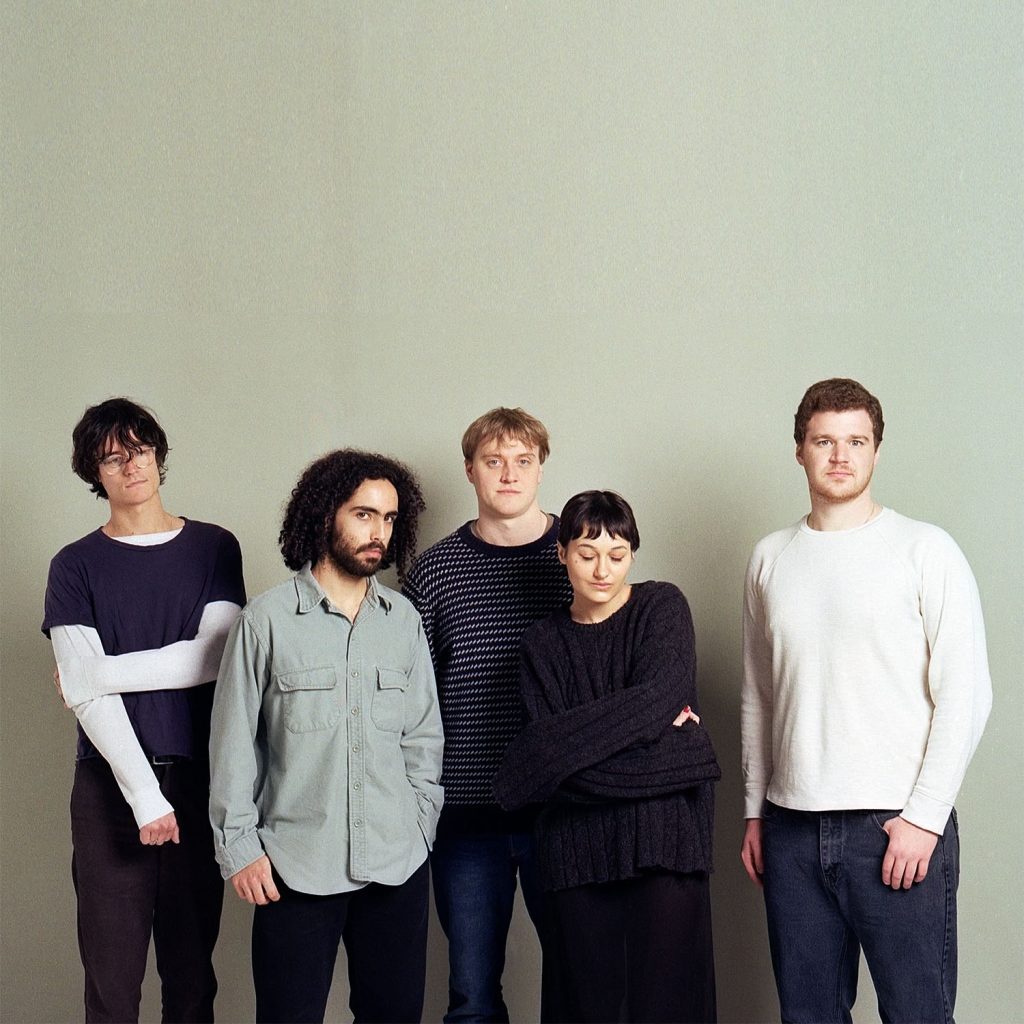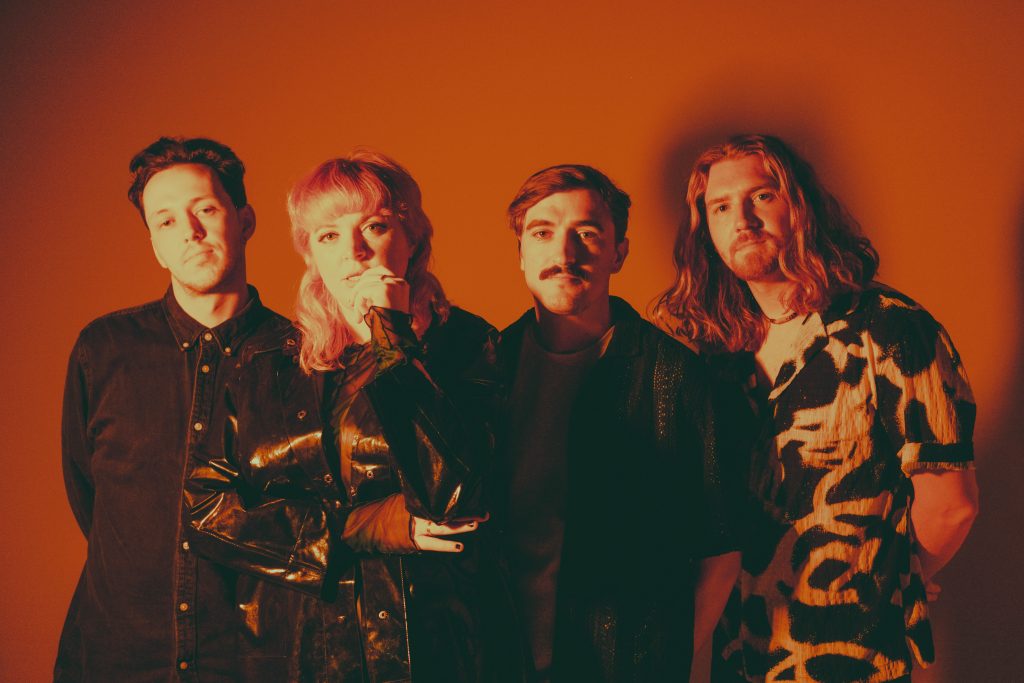
“This is an exploration of pain, passion and perseverance.”
The dedication for Sprints’ debut album serves as a neat summation of their story so far. Transforming pain into truth, passion into purpose and perseverance into strength, the Dublin four-piece have steadily grown in stature over the last three years, sharing two acclaimed EPs and building a fearsome live reputation opening for the likes of Yard Act and Suede. Letter To Self is the sound of Sprints co levelling up once again, revisiting their most vulnerable moments and imbuing their visceral garage-punk with a palpable sense of catharsis that we can all benefit from.
Singer, guitarist and lead-songwriter Karla Chubb has never shied away from confronting inner turmoil. Born in Dublin, she spent a portion of her early childhood in Germany, initially turning to music as a consequence of feeling out-of-step with the world. “I lived in a constant state of existential crisis,” she recalls. “Music became an outlet for emotion, and a way for me to understand myself and society.”
The foundations for Sprints were laid when Karla met guitarist Colm O’Reilly and drummer Jack Callan — childhood friends who’d been playing music together since the age of 10. Recruiting bassist Sam McCann to complete the line-up, the quartet found their sound after seeing Savages play Electric Picnic in 2016.
“Seeing the energy of Jehnny Beth and those gnarly guitars totally captivated us,” Jack explains. Karla continues, “I’ve always loved anger-fuelled music but I had fallen into the trap of writing what felt least offensive, simply because I saw anger as a negative emotion, rather than something that can be therapeutic and cathartic. [After watching Savages] I decided I don’t really care how I’m interpreted — I’m just going to write exactly what I feel.”
No longer second-guessing their sound, by 2019 the band were naturally gravitating towards abrasive punk-rock, synthesising influences ranging from early Pixies, Bauhaus and Siouxsie Sioux to King Gizzard, IDLES and LCD Soundsystem. “It was about being honest and energetic, and making people a little uncomfortable at the same time, whether that was musically or thematically,” says Karla, smiling. “Like: sadness or anger, but make it danceable.”
Principled and plain-spoken, Karla has always used her platform to address inequality. Debut single ‘The Cheek’ skewered the misogynistic fetishisation she’s experienced as a bi-sexual, while the title track of their 2021 EP Manifesto was inspired by the campaign for Repeal The 8th, and women’s ongoing fight for bodily autonomy. A statement of intent, that four-track collection was their first collaboration with Daniel Fox of Gilla Band. In 2022, they shared their second, in the shape of A Modern Job.
Praised by NME as “darkly defiant,” the EP saw Karla occupying what she describes as “a more self-conscious space,” laying bare her insecurities and detailing the ongoing mental health journeys within the band. For Letter To Self, the band dug even deeper, transforming so-called “negative energy” into an opportunity for communal catharsis and healing. Recorded in 12 days with Daniel Fox at Black Box Studios, in the Loire Valley, Karla describes the process as “an amazingly positive experience.”
“Lyrically it was about acknowledging everything that’s happened in my life — my traumas, my struggles with anxiety — and to close that chapter by putting it on the page. There’s been a lot of shame in my life, so I wanted the title to be the most honest, on the nose thing possible.”
Incendiary album-opener ‘Ticking’ delves straight into those feelings of fear and shame. Evocative of Rid Of Me-era PJ Harvey — and powered by the steady thump-thump of a heart-pounding drumbeat — the song mimics its subject matter, steadily growing in intensity before climaxing with thrashing guitars and Karla’s howled stream of consciousness. If ‘Ticking’ recreates the sensation of spiralling, the brutally cacophonous ‘Heavy’ communicates how it feels to be paralysed by anxiety, pairing intrusive thoughts with Surfer Rosa-style guitars.
A ferociously gothic anthem set to rule festival season, ‘Cathedral’ delves into sexuality and Catholic guilt, influenced by Karla’s experiences as a queer woman suffering from internalised homophobia. Likewise, the Paramore-inspired ‘A Wreck (A Mess)’ details her recent diagnosis with ADHD, communicating that nervous energy through its breakneck pace and sudden gear shifts. Meanwhile, ‘Shaking Their Hands’ explores the band’s commitment to their creative vision, evoking Live Through This-era Hole with bluesy Gretsch guitar, before unfurling into an ambitious epic redolent of early Radiohead.
Throughout, Sprints acquit themselves as masters of sugaring the pill, pairing powerhouse punk melodies with razor-sharp lyricism. ‘Adore Adore Adore’ is another case in point: a dark, Distillers-esque romp detailing the unfair standards women are held to in music.
If the buoyant love song ‘Literary Mind’ marks the album’s brightest moment, ‘Shadow Of A Doubt’ is unquestionably its darkest. Recorded in three takes, it features a strikingly vulnerable vocal performance punctuated by jagged breaths, and details suicidal thoughts emanating from past trauma. “Can you help me stop the screams?” Karla begs at the song’s climax, as searing guitars crash in waves around her. And yet, with the title track, the album ends on a note of acceptance, seeing Karla celebrating her autonomy in lines like, “I don’t have to take the path that was carved out in front of me.”
As she explains, that message lies at the very heart of the album. “No matter what you’re born into, or have experienced, there’s a way to emerge from this and be happy within yourself.” It’s a hard-won truth that the band hope others will be motivated by, inspiring listeners to use pain as fuel for growth, ultimately unearthing a path to seek contentment. For though the route to self-acceptance is anything but easy, with pain, passion and perseverance Sprints are proving that anything is possible.

Slow Fiction
In her poem ‘The Glass Essay’, Anne Carson writes, “You remember too much… Why hold on to all that? And I said, Where can I put it down?”. New York’s Slow Fiction recall this quote, mulling “maybe music is a place you can put it down.”
Forming out of a tapestry of hometown friendships and college connections, Slow Fiction emerged into a music scene fragmented by lockdowns. They grew closer as restrictions dropped away and audiences grew, using the shifts to experiment with their material and reach more expansive and formidable levels. The final product is a landmine of sound, inspired by the raw, sweeping fuzz of the likes of Sonic Youth and The Jesus and Mary Chain. Familiar elements of noughties era guitar shine through, confronted with cutting contemporary angst to create a nostalgic yet intoxicating sound. As the band’s confidence grew through their live shows they were liberated, taking all they had learnt in order to begin working on “a lot more cohesive and bigger sounding” project.
While their early months were spent bouncing between a variety of rehearsal and practise spaces across New York, bassist Ryan Duffin recalls “it never really felt like home for us.” Naturally, the band decided that the only reasonable solution was to move in together, forever blurring the boundaries between ‘normal’ life and artistry, and enabling the friends to fall into an endless process of experimentation and creation. “There’s always someone playing an instrument in the house” explains vocalist Julia Vassallo, meaning even when the band aren’t “actively writing”, they are just a spark away from a period of spontaneous creation.
The result of this shift from a rootless creative environment to an incredibly intimate, shared space is Slow Fiction’s ‘Crush EP’, an immersive and transformative force. Opening with the frantic energy of ‘Monday’, a track described by the band as “the moment just before the storm hits” and sprawling continually outwards from there. The EP proceeds to swerve through a dizzying array of experiences, from the discord of dreams and reality on ‘Apollo’ to the delusion of ‘a blinding crush and the mistakes that are made in pursuit of it’ as explored on the aching ‘There Were Stars In Your Eyes’
It is with ‘January’, a meditative rumination of all that comes before, that the EP’s cycle is revealed. Described by the band as “the reckoning”, the track explores “knowing that you just experienced something difficult, and that you aren’t out of the woods quite yet, but you can be eventually.” The whirlwind of emotions displayed across the track tie together the tales and emotions of the EP, all while vocalist Julia confronts “accepting that you’ve been the antagonist in your life at certain points.”
Slow Fiction are quickly beginning to establish themselves as one of the most riveting and engaging live bands emerging from the bubbling scene of New York right now. This EP goes further to prove their potential, borrowing notes of nostalgia and pairing it with hard hitting truths and indisputable emotional weight. The masterful intertwining of personal anguish with the array of musical inspirations and fuzzy, intoxicating tones makes Slow Fiction one of the most exciting acts emerging right now, and this EP is just the beginning.



